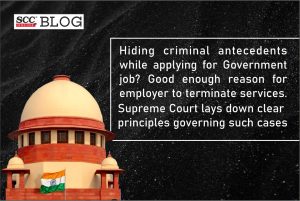Supreme Court: While dealing with a case relating to termination of a CRPF probationer for suppressing material information relating to his criminal antecedents, the bench of Surya Kant and JB Pardiwala*, JJ realised that the principles of law laid down in various rulings governing the subject were inconsistent. It, hence, shortlisted the following broad principles of law to be made applicable to such cases:
a) Each case should be scrutinised thoroughly by the public employer concerned, through its designated officials–more so, in the case of recruitment for the police force, who are under a duty to maintain order, and tackle lawlessness, since their ability to inspire public confidence is a bulwark to society’s security.
b) Even in a case where the employee has made declaration truthfully and correctly of a concluded criminal case, the employer still has the right to consider the antecedents and cannot be compelled to appoint the candidate. The acquittal in a criminal case would not automatically entitle a candidate for appointment to the post. It would be still open to the employer to consider the antecedents and examine whether the candidate concerned is suitable and fit for appointment to the post.
c) The suppression of material information and making a false statement in the verification Form relating to arrest, prosecution, conviction etc., has a clear bearing on the character, conduct and antecedents of the employee. If it is found that the employee had suppressed or given false information in regard to the matters having a bearing on his fitness or suitability to the post, he can be terminated from service.
d) The generalisations about the youth, career prospects and age of the candidates leading to condonation of the offenders’ conduct, should not enter the judicial verdict and should be avoided.
e) The Court should inquire whether the Authority concerned whose action is being challenged acted mala fide.
f) Is there any element of bias in the decision of the Authority?
g) Whether the procedure of inquiry adopted by the Authority concerned was fair and reasonable?
Background
- The appellant was serving as a Constable (General Duty) with the CRPF. He was recruited as a temporary employee of the post of Constable (GD) in the CRPF on 28.07.2014. After undergoing the basic training, he reported at the 179th Battalion on 17.12.2015.
- While filling up the requisite verification Form–25 at the time of his recruitment in the CRPF in response to the question whether any case was pending against him, the appellant answered in the negative.
- Upon verification it was found out that a criminal case had been registered against him for the offences punishable under Sections 147, 323, 324, 504 and 506 IPC.
- He was hence terminated in exercise of the powers conferred under Rule 5(1) of the Central Civil Services (Temporary Service) Rules, 1965 vide the order dated 11.03.2016 on the ground that he had concealed the information as aforesaid while filling up the Form–25.
Delhi High Court’s Ruling
The High Court dismissed the writ petition filed by the appellant challenging the termination and observed,
“In the present case, on the date of filling up of the verification form the criminal case against the Petitioner was very much pending. The fact that the charge sheet had been filed after the filling up the form will not make any difference to the fact that the Petitioner deliberately gave a wrong answer to the question whether any case was pending against the Petitioner. This could not be termed as innocent.”
Supreme Court’s Ruling
The Court agreed with the High Court’s ruling that it was a deliberate attempt on the part of the appellant to withhold the relevant information and it is this omission which has led to the termination of his service during the probation period.
The Court observed that the judgment in Kendriya Vidyalaya Sangathan v. Ram Ratan Yadav, (2003) 3 SCC 437, squarely applied to the facts of the case wherein it was held that neither the gravity of the criminal offence nor the ultimate acquittal therein was relevant when considering whether a probationer who suppresses a material fact (of his being involved in a criminal case, in the personal information furnished to the employer), is fit to be continued as a probationer.
It was, hence, held that if an enquiry revealed that the facts given were wrong, the respondent was at liberty to dispense with the services of the appellant as the question of any stigma and penal consequences at this stage would not arise. He could be said to have exhibited or displayed such a tendency which shook the confidence of the respondent.
[Satish Kumar Yadav v. Union of India, 2022 SCC OnLine SC 1300, decided on 26.09.2022]
*Judgment by: Justice JB Pardiwala
For appellant: Advocate Jyoti Dutt Sharma
For Respondent: ASG Madhavi Divan

